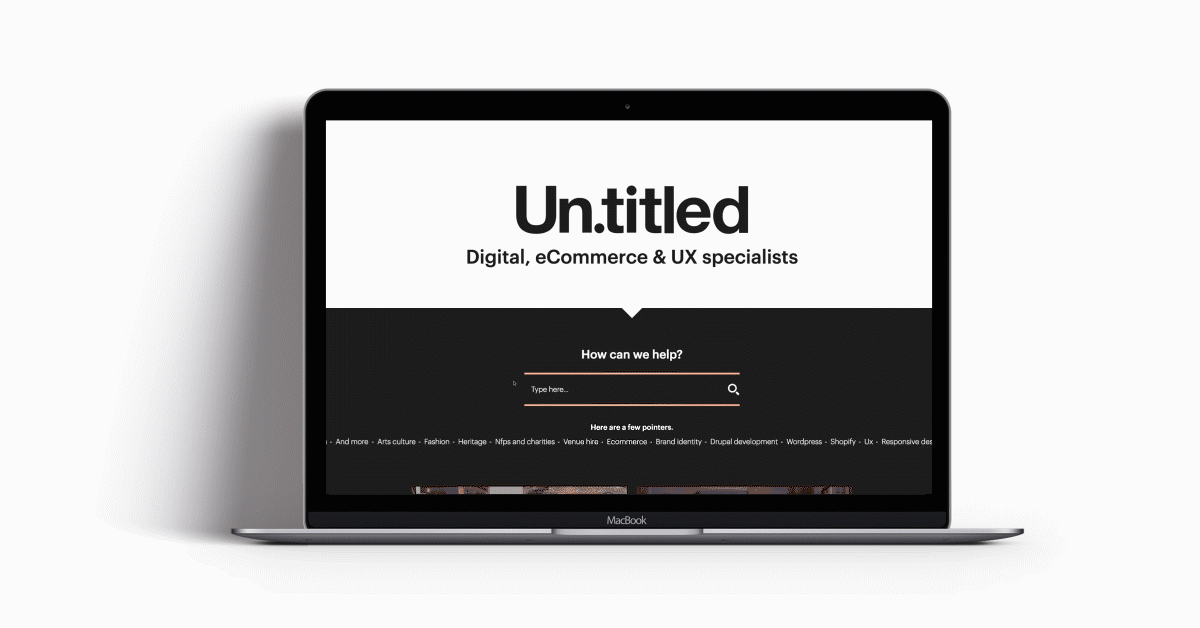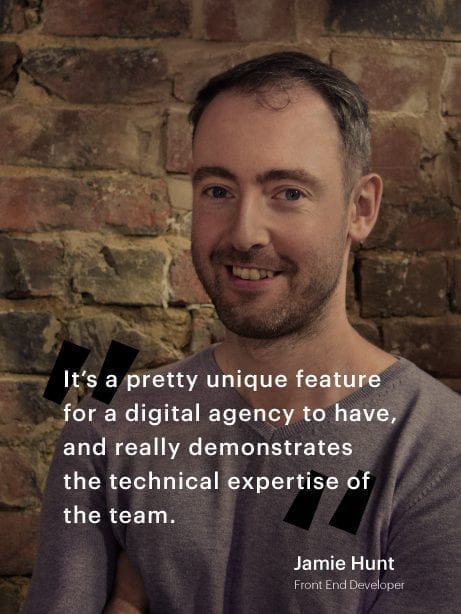
Why search?
“In our initial discussions about the new website, Brian wanted us to take a different approach when it came to how users navigate and find content on the website,” explains Jamie Hunt, Senior Front-End Developer at Un.titled. “One key question was around how we might enable users to find the most relevant content, matched to their reason for visiting the site. Obviously the traditional approach is to use menus, signposts and CTA’s (well thought out calls-to-action).”
“All well and good but firstly it kind of forces the user down specific, sometimes narrow journeys and it can easily lead to lots of clicking through to landing pages and category pages before getting to what MIGHT be what you’re looking for. In short it doesn’t encourage or reward exploration or discovery. So instead we’ve gone a slightly different route and put search front and centre, effectively making search the main navigation tool for the site.”
The search function, most obvious on the Un.titled homepage, is designed to offer a more tailored experience, a more relevant experience and as Jamie alludes to, a more playful experience.
So the search is where to start.
“It’s a pretty unique feature for a digital agency to have. It demonstrates the technical expertise as well as the creative thinking across the team,” Jamie says. “This kind of approach is often used by ecommerce companies and obviously it is 99% of what Google is about but few peer group agencies like ourselves look to use search in this way. It’s something that will help us stand out from the crowd while also helping visitors find relevant content easier and quicker.”

How does it work?
Un.titled’s search functionality uses Algolia– an external platform we tie into via their API.
“Algolia collates all blogs, posts, pages on the site into an index,” Jamie explains. “As everything is collated beforehand, results are pre-generated. Users are sent to the nearest data-centre, reducing latency, while duplicate queries are cache, which reduces computational time. Most of the computations required to return results are done when records are indexed and not queried.”
This means that things are fast. Like super-fast. You can typically get results in a millisecond (that’s 0.001 of a second). It gets better. Algolia is packed with super helpful features.
“As you enter your search terms, suggested content appears based on what you’re entering,” Jamie says. “This includes an image, page or article title, and a brief information about what the page includes. There’s also a tag so you can tell what kind of page it is – blog, service page etc. This helps give users a quick summary of results to make it easy to understand what searches are being returned.”
Tailored to visitor needs
“The search index is modified to promote certain results,” Jamie says. “We’ve tailored this to provide site visitors with the most relevant results for their queries. This is done by Algolia’s query rules, allowing for more specific results to be given. On the results page, we use Algolia’s instant search API to update the results, title, pagination, results on the fly based on what you enter.”
Synonyms are also an important element, helping to bring the most relevant results up. This is achieved through general customisation. So as an example, if you search for ‘charities’, ‘not for profit’, and ‘nfps’, you’ll be guided to our charity page.
Similarly, if you search on our site for the terms ‘jobs’, ‘careers’ or ‘vacancies’ – the our vacancies page will appear. Search for ‘PPC’, ‘paid search’, ‘google ads’ or ‘bing ads’, and you’ll be taken to our PPC page.
And once you’ve started navigating your way through the site, you can easily go back to the search function by clicking search in the navigation bar.
“It’s been a really interesting process and I think users will appreciate how navigable the site is and how different from the norm we’ve looked to be,” Jamie adds. “Also, special mention should go to the Algolia team. They’ve been really helpful and achieve what we were looking to with the search.”
Be sure to browse through the full Un.titled site, and if you like what you see, why not say hello?





